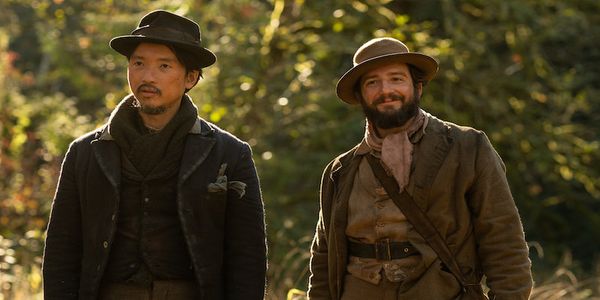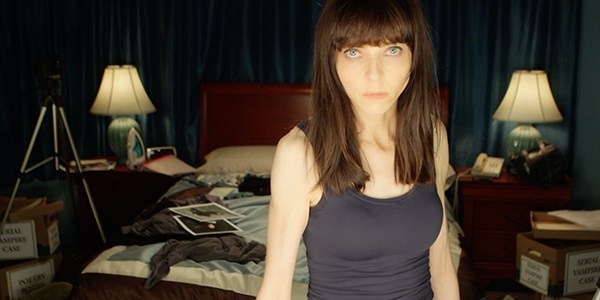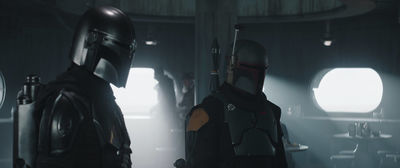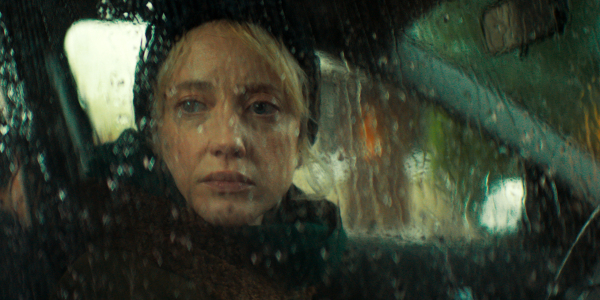Tim Heidecker’s ‘Fear of Death,’ Lars von Trier’s ‘Melancholia,’ and the Comfort in Facing the End
“I’m forty-four and starting to feel mid-life anxiety: mortality is actually feeling real,” Tim Heidecker reflects in an interview with Variety promoting his new indie rock album, Fear of Death. “I have kids now and I just start thinking dumb shit: ‘I might not know my kids’ grandchildren.’ It’s a waste of time.”
He continues: “But death can also be very funny and absurd. It can be ridiculous. It’s something that’s going to happen to everybody, as far as we know. There’s just a black void waiting down the road, and we’re all walkin’ towards it.”
Heidecker is no stranger to life’s little absurdities, having centered the bulk of his career on it. Although ostensibly a creative one-eighty for a comedian to suddenly dabble in music surrounding human mortality, Heidecker’s previous collaborative ventures – including Tim and Eric Awesome Show Great Job!, On Cinema at the Cinema, and Tom Goes to the Mayor – are absurdist, alt-comedy staples and proof of an artist fascinated with the surrealness of everyday life.
Thus, Heidecker has simply further honed his examination of the irrationality of both life and death, albeit in a completely different format. Since 2016, he’s quietly carved himself out a folk-rock path mostly separate from his comedy. And his latest contribution – a collaboration with fellow musicians Natalie Mering, the Lemon Twigs, and others, and touching on topics like aging, nihilism, climate change, and capitalism – can’t help but feel incredibly of this dark moment, and also somehow incredibly reassuring.
Although recorded over a year ago, the album was released during an unprecedented time: when a pandemic has overwhelmed our planet and many of us can’t help but think about death because of it. It’s the album’s upbeat, singular focus on something we humans in Western civilization positively revile in fixating on that creates an unlikely kind of relief towards it — and just when we need it the most.
This is not dissimilar to the effect of Lars von Trier’s apocalyptic existentialist film Melancholia. Following a woman, who is in a deep depression, and her family members as they each confront the impending collision of a planet that will wipe out Earth, Melancholia leads us through its story in three chapters by way of melancholic Justine (Kirsten Dunst). Beginning with Justine’s disastrous, doomed wedding and following the discovery of a planet dubbed “Melancholia” that is hurtling towards Earth, the film reaches the eventual revelation that the massive celestial object – previously hidden behind the sun and thought to only be a “fly-by” – will indeed make contact and destroy us.
Justine’s debilitating malaise is seen as keeping her from functioning properly in society; her sister, Claire (Charlotte Gainsbourg), however, is fully accustomed to the made-up expectations and rules of life. Claire and her husband, John (Kiefer Sutherland), consistently scold Justine for being late to and throwing off her wedding after-party itinerary, while Justine’s inability to care is met with reproach. By the end of the film, Claire’s devotion to the normalcy of life’s manufactured rituals stunts her ability to cope with the end of the world – Justine, on the other hand, finds herself comfortably in a state of cool.
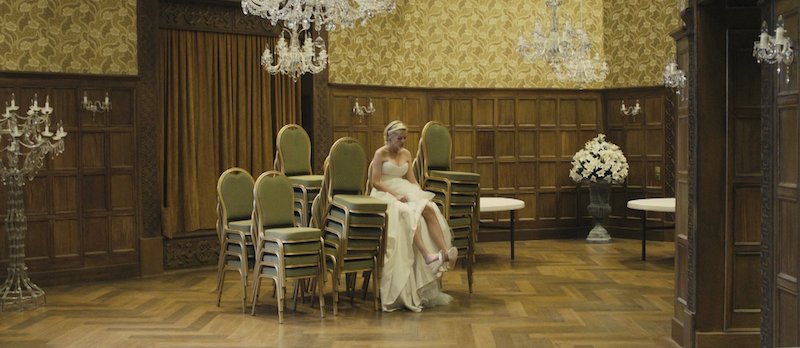
While the film is infamously dreary and dystopic, in its unwaveringly bleak denouement arises a surprising solace. In a recent, pandemic-centric piece for The Atlantic, author Mallika Rao discusses the implications of Melancholia and finding reassurance in impending doom – on how various philosophical and religious movements, from Buddhism to Stoicism, have their own panaceas to the poison of our collective fear of death.
Rao writes, “In both cases, focus on a feared outcome is thought to prepare one for it, and indeed, can, perhaps counterintuitively, engender a higher state of joy than for someone who refuses to look fear in the face.” In Justine’s calm, she finds peace, that which has eluded her for the majority of the film. Claire, alternatively, becomes restless, tormented until the very end.
Melancholia was inspired by von Trier’s own experience with deep depression. Heidecker’s conception of an album that acts as a kind of confrontation of a mid-life crisis, on the other hand, was not so intentional; it was just what he ended up writing about. “Some of that wasn’t really apparent right away,” he says in an interview with Under the Radar. “It’s only afterward that I see that there’s a link with all this stuff.”
On the album’s eponymous first single, Heidecker and Mering harmonize joyfully over Heidecker’s latent nihilistic approach to existence – not wanting to leave the house, not seeing the point in having fun, lingering on until old age or otherwise consumes him and he’s finally forced to let go. “Fear of death is keeping me alive” he croons repeatedly on the track’s buoyant chorus.
He jokes in another interview, with InsideHook, about the counterbalance between his dark subject material and his catchy, simplistic chords (which he views as indicative of his limited musical prowess): “I love that juxtaposition. I mean, a lot of people do that. I think Tom Petty’s a good person who does that, having this sardonic dark subject matter, but there’s a poppiness to it.
But it’s less about the bubbly melodies of Heidecker’s album when it comes to its effectiveness in finding comfort in death, and more about the lyrical turn of phrase. Heidecker doesn’t beat around the bush in his global warming-centered song “Backwards,” ruminating on the hope his generation had held towards the once-bright future, and the hard days yet to come for young children still blissfully ignorant to environmental catastrophe.
And yet, in this bleak admission springs an unlikely optimism. A topic as hastily avoided as death, the existential blow of climate change feels lessened when people are willing to talk about it, instead of pretending that it isn’t really happening. One could view the unwillingness of some to admit that climate change is real as more symptomatic of fear than ignorance. The potential of climate change is terrifying, and to accept that it’s real is harder than to continue to live one’s life as if it isn’t.
“No one wants to believe their daily activities are responsible for a global disaster that has already turned millions of people into climate refugees and killed scores of others,” writes Nsikan Akpan for PBS NewsHour. The simple act of opening that dialogue on Heidecker’s song offers a form of hope. Acceptance is the first step towards progress.
Heidecker doesn’t write in flowery metaphor or allegory – there’s no cushion of gratuitous poeticism to shield the blow of reality. On “Nothing,” he speaks bluntly on how humans will all die alone, that Heaven doesn’t exist, and that these thoughts consistently overwhelm him as he tries to maintain normalcy in his occasionally glamorous lifestyle in the entertainment industry. “Shopping for a suit for the big premiere, nobody could tell me how I got here. Looking real good, but I’m filled with fear,” he admits on the track.
Still, he doesn’t want people to think he’s an excessively morbid person: “I don’t go around thinking about dying all of the time, but that can be therapeutic to talk about or sing about,” Heidecker says. And yet, a 2016 HuffPost article reveals that “regular contemplation of death can lead to a deep experience of joy as old attachments and negative habits are released,” a sentiment divulged by Tibetan Buddhist teacher Sogyal Rinpoche in The Tibetan Book of Living and Dying.
In the aforementioned Atlantic piece, Mallika Rao also discusses the calm that an anxiety-ridden friend of hers suddenly experienced during the pandemic — finding a sense of ease in knowing that the rest of the world felt the same way that she does on a day-to-day basis. It’s yet another link between Melancholia and Fear of Death: a cultivated sense of community amidst chaos. Justine finds peace in a world where her malaise is rational; Heidecker creates a space where an openness towards mortality produces joy.
“I try to keep music a thing that gives me happiness,” Heidecker explains to Pitchfock, and Fear of Death certainly does just that. On songs with lyrics that reference our “imminent death” and the fading memory of our individual existence over centuries, is inescapable beauty. The album becomes a microcosm of life itself. In the small amount of time we’ve been given, we endure love, loss, growth, change, ugliness, and agony, but to have experienced it is a gift, one we experience together.
In the final stretch of the planet Melancholia’s path towards a collision with Earth, Justine notices a change. The horses in her sister’s stable, once wild in uncontrollable distress prior to the planet’s first appearance, have gone silent. “There’s something different,” she says. “The horses, they’ve calmed down.” In the face of approaching death, what is there left to do?
Claire cannot fathom a non-existent Earth, unsure of where her son Leo will grow up because of her doomed faith in the firmness of life. She tries to take Leo and run off to a safe place that simply doesn’t exist, and her difficulty in accepting her inescapable demise only makes things worse for her. Her astronomer husband, John, though initially full of rationality, commits a quick suicide immediately after realizing that the calculations of his revered scientists were incorrect, and Melancholia will indeed destroy Earth.
But Justine, in her depressive haze almost prepared her entire life for a situation such as this, does not look away, panic, or overwhelm herself. Even as Melancholia hurtles towards Earth, Claire writhes and squirms on the ground while Justine sits serenely beside her, before the planet obliterates them and everything they ever knew. Justine takes it all in, relishing it, embracing that which will take her life away.
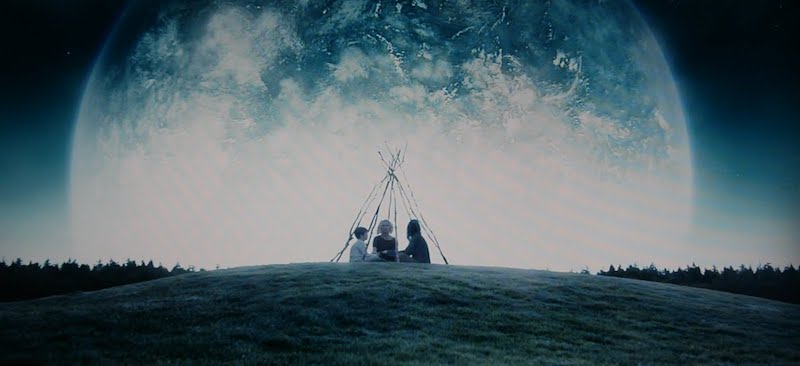
Although Justine is the only character presented with the perspective of having a genuine lack of fear, there is still a sense of overall calmness in the film’s gloomy completion. “Please don’t be afraid,” she had urged Leo, in one of their last moments alive together, and in togetherness is exactly what they are. Leo and Justine build a makeshift “magic cave” from branches in the woods, which they place in the yard in front of Claire’s massive house for the three of them to sit under, as they watch Melancholia plunge toward them. The camera opens into a gorgeous wide shot, encompassing their three tiny figures at the center of the frame while the planet rapidly engulfs the rest, taking over the screen, swallowing them up. It is beautiful and bittersweet. It is the end
Heidecker has a fear of death, but he created an album that acts as a celebration of life – perhaps best personified in his major key cover of the Beatles’ “Let it Be.” The shift in chords turns the iconic, meditative ballad about accepting loss into a jubilant folk song, preluding the album’s final two tracks: one about loving someone unconditionally, the other a melancholic reflection on the ephemeral nature of human existence.
The final triad of songs is emblematic of what feels like Heidecker’s personal conclusion on life and death. The big black void waiting for us down the end of the road is far less imminent than a rogue planet on a crash course for Earth, but a crash course for our lives is undaunted, nonetheless. What else can we do but let it be?
